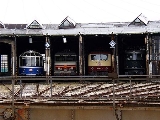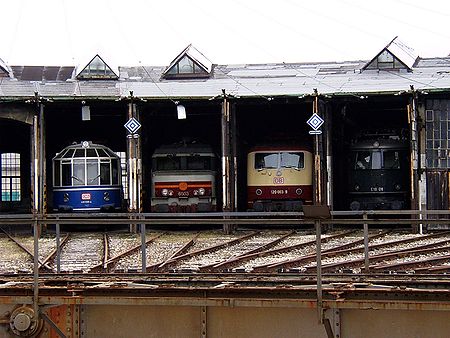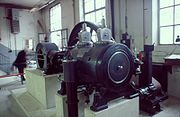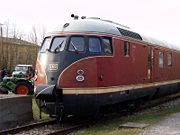
Augsburg Railway Park
Encyclopedia

Railway museum
A railway museum is a museum that explores the history of all aspects of rail related transportation, including: locomotives , railway cars, trams, and railway signalling equipment.See List of railway museums...
in Augsburg
Augsburg
Augsburg is a city in the south-west of Bavaria, Germany. It is a university town and home of the Regierungsbezirk Schwaben and the Bezirk Schwaben. Augsburg is an urban district and home to the institutions of the Landkreis Augsburg. It is, as of 2008, the third-largest city in Bavaria with a...
on part of the former Augsburg
Augsburg
Augsburg is a city in the south-west of Bavaria, Germany. It is a university town and home of the Regierungsbezirk Schwaben and the Bezirk Schwaben. Augsburg is an urban district and home to the institutions of the Landkreis Augsburg. It is, as of 2008, the third-largest city in Bavaria with a...
locomotive shed owned by the Deutsche Bahn
Deutsche Bahn
Deutsche Bahn AG is the German national railway company, a private joint stock company . Headquartered in Berlin, it came into existence in 1994 as the successor to the former state railways of Germany, the Deutsche Bundesbahn of West Germany and the Deutsche Reichsbahn of East Germany...
. At present the Railway Park is still under construction and is therefore only open to visitors for certain exhibitions. It will be officially re-opened on 13 April 2009. In the future, 29 historic locomotive
Locomotive
A locomotive is a railway vehicle that provides the motive power for a train. The word originates from the Latin loco – "from a place", ablative of locus, "place" + Medieval Latin motivus, "causing motion", and is a shortened form of the term locomotive engine, first used in the early 19th...
s from the EU member countries and also Switzerland
Switzerland
Switzerland name of one of the Swiss cantons. ; ; ; or ), in its full name the Swiss Confederation , is a federal republic consisting of 26 cantons, with Bern as the seat of the federal authorities. The country is situated in Western Europe,Or Central Europe depending on the definition....
will be exhibited in the roundhouse
Roundhouse
A roundhouse is a building used by railroads for servicing locomotives. Roundhouses are large, circular or semicircular structures that were traditionally located surrounding or adjacent to turntables...
and on the turntable
Turntable (railroad)
A railway turntable is a device for turning railroad rolling stock. When steam locomotives were still in wide use, many railroads needed a way to turn the locomotives around for return trips as their controls were often not configured for extended periods of running in reverse and in many...
, the so-called Europa Roundhouse (Rundhaus Europa), which are protected historical buildings. In addition to the roundhouse there are also three historical steam locomotive halls with a workshop
Workshop
A workshop is a room or building which provides both the area and tools that may be required for the manufacture or repair of manufactured goods...
atmosphere and a historical smithy
Smithy
Smithy may refer to:* Forge, also called a smithy, the workplace of a smith or a blacksmith* Smith , sometimes referred to as a smithy, a person involved in the shaping of metal objects...
.
Museum project and events
The Augsburg Railway Park offers the national railways of all EU states the opportunity to exhibit a historic locomotive (a so-called 'ambassador' locomotive) im the "Europa Roundhouse". The culture of the country of origin of an exhibition is always the focus. The historical locomotives will be accessible to visitors to the site or will be displayed on the turntable. From time to time there will also be national weeks (e. g. Austria week), sometimes with additional special exhibitions related to the region being celebrated. As part of some events there will be jazz concerts in the large steam engine hall and presentations in the smithy. In addition there are restaurants permanently on site. Regular jazz concerts (Jazz in the Railway Park) take place on the first Sunday in the month from May to September. In addition to the ambassador locomotives there are many other museum locomotives in the collection, which it has not always been easy to view before. The whole collection is being continually expanded. During AdventAdvent
Advent is a season observed in many Western Christian churches, a time of expectant waiting and preparation for the celebration of the Nativity of Jesus at Christmas. It is the beginning of the Western liturgical year and commences on Advent Sunday, called Levavi...
, special steam engine services are organised, that offer journeys through the winter landscape.
The site
In 1906 the Royal Bavarian State RailwaysRoyal Bavarian State Railways
As a nation-state, Germany did not come into being until the creation of the German Empire in 1871 from the various German-speaking states such as Prussia, Bavaria, Saxony, Baden and Württemberg. By then each of the major states had formed its own state railway and these continued to remain...
built two roundhouses with turntables south of the Augsburg Hauptbahnhof
Augsburg Hauptbahnhof
is the Hauptbahnhof for the Bavarian city of Augsburg, situated in southern Germany.The station has one of the oldest still existing station halls in Germany, which was built from 1843 to 1846 after plans by architect Eduard Rüber. It was reconstructed in 1869 according to Friedrich Bürklein's plans...
(Augsburg Central Station). On the area surrounding the Railway Park are further buildings (workshops, washdown areas, wheelset repair workshops and accommodation for the locomotive crews) belonging to the former repair shop together with trackage and a signal box
Signal box
On a rail transport system, signalling control is the process by which control is exercised over train movements by way of railway signals and block systems to ensure that trains operate safely, over the correct route and to the proper timetable...
. In the Second World War the area was largely spared from bomb damage, even on the devastating night of bombing from 25 to 26 February1944 on Augsburg
Augsburg
Augsburg is a city in the south-west of Bavaria, Germany. It is a university town and home of the Regierungsbezirk Schwaben and the Bezirk Schwaben. Augsburg is an urban district and home to the institutions of the Landkreis Augsburg. It is, as of 2008, the third-largest city in Bavaria with a...
, during which the main station and station yard was badly damaged or destroyed. After the war the Deutsche Bahn AG used the site until about 1990. Since 1996 the roundhouse
Roundhouse
A roundhouse is a building used by railroads for servicing locomotives. Roundhouses are large, circular or semicircular structures that were traditionally located surrounding or adjacent to turntables...
has been placed under historical building protection. The owner of the site is the Aurelis Real Estate GmbH & Co.KG.
Workshops
In the workshops of the Augsburg Railway Park, railway vehicles are refurbished and restored to museum standards. A historical post van was restored in these workshops for the Deutsches Museum's Transport Centre, a branch of the Deutsches MuseumDeutsches Museum
The Deutsches Museum in Munich, Germany, is the world's largest museum of technology and science, with approximately 1.5 million visitors per year and about 28,000 exhibited objects from 50 fields of science and technology. The museum was founded on June 28, 1903, at a meeting of the Association...
on the Teresienhöhe/Schwarntalerhöhe. The maintenance and preservation of the operational and protected DRG Class 41
DRG Class 41
The German Class 41 steam locomotives were standard goods train engines operated by the Deutsche Reichsbahn and built from 1937 - 1941.- History :...
steam locomotive, no. 41 018, belonging to the Munich Steam Locomotive Company
Munich Steam Locomotive Company
The Munich Steam Locomotive Company is charitable society based in Munich, Germany, whose aim is to preserve the oil-fired steam locomotive, number 41 018, as an operational locomotive.- Society :...
(Dampflok-Gesellschaft München) was also carried out by thse workshops.
Vehicles in the Europa Roundhouse
- RailbusRailbusA railbus is a very lightweight type passenger rail vehicle that shares many aspects of their construction with a bus, usually having a bus, or modified bus body, and having four wheels on a fixed base, instead of on bogies...
ET 91 01DRG Class ET 91The Baureihe ET 91 was a series of electric multiple units built for the Deutsche Reichsbahn-Gesellschaft of Germany. The units colloquially known as Gläserner Zug were equipped with large panorama windows, providing an excellent outside view to the passengers...
The Glass Train (Gläserne Zug) (GermanyGermanyGermany , officially the Federal Republic of Germany , is a federal parliamentary republic in Europe. The country consists of 16 states while the capital and largest city is Berlin. Germany covers an area of 357,021 km2 and has a largely temperate seasonal climate...
) - Electric locomotiveElectric locomotiveAn electric locomotive is a locomotive powered by electricity from overhead lines, a third rail or an on-board energy storage device...
CC 6503 "Aquitaine" (FranceFranceThe French Republic , The French Republic , The French Republic , (commonly known as France , is a unitary semi-presidential republic in Western Europe with several overseas territories and islands located on other continents and in the Indian, Pacific, and Atlantic oceans. Metropolitan France...
) - Electric locomotive BB 3600 The Ducal Crocodile (Das großherzogliche Krokodil) (LuxembourgLuxembourgLuxembourg , officially the Grand Duchy of Luxembourg , is a landlocked country in western Europe, bordered by Belgium, France, and Germany. It has two principal regions: the Oesling in the North as part of the Ardennes massif, and the Gutland in the south...
), the SNCF BB 12000 is the French version of this engine class - Electric locomotive Ae 4/7 The Gotthard Loco (Gotthard-Lok“) (SwitzerlandSwitzerlandSwitzerland name of one of the Swiss cantons. ; ; ; or ), in its full name the Swiss Confederation , is a federal republic consisting of 26 cantons, with Bern as the seat of the federal authorities. The country is situated in Western Europe,Or Central Europe depending on the definition....
) - Steam locomotiveSteam locomotiveA steam locomotive is a railway locomotive that produces its power through a steam engine. These locomotives are fueled by burning some combustible material, usually coal, wood or oil, to produce steam in a boiler, which drives the steam engine...
06-013 Mountain Express (Gebirgs-Schnellzug-Dampflok) (SloveniaSloveniaSlovenia , officially the Republic of Slovenia , is a country in Central and Southeastern Europe touching the Alps and bordering the Mediterranean. Slovenia borders Italy to the west, Croatia to the south and east, Hungary to the northeast, and Austria to the north, and also has a small portion of...
) - Steam locomotive 93.1410 The Dampfbier Loco of the Ustersbach Private Brewery (AustriaAustriaAustria , officially the Republic of Austria , is a landlocked country of roughly 8.4 million people in Central Europe. It is bordered by the Czech Republic and Germany to the north, Slovakia and Hungary to the east, Slovenia and Italy to the south, and Switzerland and Liechtenstein to the...
) - Forest railway steam locomotive 764.449 Cozia-2 (Rumania), a narrow gaugeNarrow gaugeA narrow gauge railway is a railway that has a track gauge narrower than the of standard gauge railways. Most existing narrow gauge railways have gauges of between and .- Overview :...
engine on its own plinth in the museum site - Electric locomotive E 636 147 (ItalyItalyItaly , officially the Italian Republic languages]] under the European Charter for Regional or Minority Languages. In each of these, Italy's official name is as follows:;;;;;;;;), is a unitary parliamentary republic in South-Central Europe. To the north it borders France, Switzerland, Austria and...
)
Further ambassador locomotives are planned for Spring 2008.
Museum locomotives
- Steam locomotive DRG Class 41DRG Class 41The German Class 41 steam locomotives were standard goods train engines operated by the Deutsche Reichsbahn and built from 1937 - 1941.- History :...
, no. 41 018 (Munich Steam Locomotive Company) - Steam locomotive DRG Class 41DRG Class 41The German Class 41 steam locomotives were standard goods train engines operated by the Deutsche Reichsbahn and built from 1937 - 1941.- History :...
, no. 41 364 - Goods train locomotive DRG Class 44DRG Class 44The Class 44 was a ten-coupled, heavy goods train steam locomotive built for the Deutsche Reichsbahn as a standard steam engine class . Its sub-class was G 56.20 and it had triple cylinders...
, no. 44 606, Jumbo (Munich Steam Locomotive Company) - Express trainExpress trainExpress trains are a form of rail service. Express trains make only a small number of stops, instead of stopping at every single station...
standard locomotive (Einheitsdampflok) DRG Class 01DRG Class 01The Deutsche Reichsbahn-Gesellschaft's BR 01 steam locomotives were the first standardised steam express passenger locomotives built by the unified German railway system. They were of 4-6-2 "Pacific" wheel arrangement in the Whyte notation, or 2′C1′ h2 in the UIC classification. The idea of...
, no. 01 1081, (being restored) - Electric locomotive E 16 09DRG Class E 16The DRG Class E 16 were German electric locomotives in service with the Bavarian Group Administration of the Deutsche Reichsbahn were conceived as motive power for express trains...
Bavaria's Noble Racer (Bayerns Edelrenner) - Electric locomotive E 18 08DRG Class E 18The Deutsche Bundesbahn Baureihe E 18 is a class of electric locomotives in Germany, originally operated by Deutsche Reichsbahn-Gesellschaft...
- Electric locomotive E 63 05 and E 63 08
- Branch lineBranch lineA branch line is a secondary railway line which branches off a more important through route, usually a main line. A very short branch line may be called a spur line...
locomotive E 69 02 - Goods train E 91 99DRG Class E 91Three different types of German electric goods train locomotive belonged to the Deutsche Reichsbahn's DRG Class E 91. In addition to the standard locomotives described below there was also a Prussian class that was given the designation E 913 in 1927.-History:As early as 1922 the first order was...
(on loan from the Nuremberg Transport MuseumNuremberg Transport MuseumThe Nuremberg Transport Museum is based in Nuremberg, Germany, and consists of the Deutsche Bahn's own DB Museum and the Museum of Communications . It also has two satellite museums at Koblenz-Lützel and Halle...
) - Electric locomotive 1141.03
- Köf II 6311 and 6580 (operational, shunting duties in the Railway Park)
- Electric locomotive 120 003 (on loan from the Nuremberg Transport Museum)
- Electric locomotive E 71 19 (on loan from the Nuremberg Transport Museum)
- Railway trolley collection 'Rail midgets' (Schienenflöhe)
- Historic railway post van from 1926 and other railway postal vehicles (Nuremberg Museum of Communications) may be viewed in the steam engine hall
Railway trolley collection 'rail midgets' (Schienenflöhe)
As well as the ambassador and museum locomotives stabled at the Augsburg Railway Park there is also a small collection of railway trolleys belonging to the Bavarian Railway Trolley Friends (Draisinenfreunde Bayern e.V.). This type of railway vehicle was formerly used by the railway maintenance divisions to inspect and maintain tracks and signal installations. The collection has a total of five vehicles: a touring trolley (Bereisungsdraisine) KLV 11, two maintenance trolleys, KLV 12 and 82, a Hungarian trolley, MAV Pft-P401, a rail bicycle and a rail moped. At the events there are often opportunities to ride in the KLV 11, something especially popular with children. The KLV 12, KLV 82 and MAV Pft-P401 trolleys are not currently operational and are being refurbished.Raupach steam engine

Steam engine
A steam engine is a heat engine that performs mechanical work using steam as its working fluid.Steam engines are external combustion engines, where the working fluid is separate from the combustion products. Non-combustion heat sources such as solar power, nuclear power or geothermal energy may be...
was built in 1911 by the engineering works of "Richard Raupach", based on the system by R. Lenke, in Görlitz
Görlitz
Görlitz is a town in Germany. It is the easternmost town in the country, located on the Lusatian Neisse River in the Bundesland of Saxony. It is opposite the Polish town of Zgorzelec, which was a part of Görlitz until 1945. Historically, Görlitz was in the region of Upper Lusatia...
. It could generate 75 PS. Once upon a time, more than 1000 examples of this engine were built, that were used in many factories to provide electrical energy. Originally this particular engine was delivered to the Schaaf Brewery in Niedermending near Koblenz
Koblenz
Koblenz is a German city situated on both banks of the Rhine at its confluence with the Moselle, where the Deutsches Eck and its monument are situated.As Koblenz was one of the military posts established by Drusus about 8 BC, the...
, where it was in service in 1932. But in the same year the engine was sold to the distillery in Munich-Grosshadern. There it was used to drive various aggregates. Not until the closure of the distillery in 2001 was the steam engine finally taken out of service, having operated for 90 years. Members of the Munich Steam Locomotive Company
Munich Steam Locomotive Company
The Munich Steam Locomotive Company is charitable society based in Munich, Germany, whose aim is to preserve the oil-fired steam locomotive, number 41 018, as an operational locomotive.- Society :...
made contact with the distillery company and succeeded in acquiring the steam engine. On 26 July 2003, it was dismantled and moved by low-loader to the Railway Park. There it was temporarily housed in the northern roundhouse and restored. After the events exhibiting the steam engine in its intermediate location, it was moved at the end of October 2003. After further work, it was operational again on 16 July 2007. This time however it was not driven by steam, but for display purposed worked by an electric motor and illuminated.
150th anniversary of Rudolf Diesel

Rudolf Diesel
Rudolf Christian Karl Diesel was a German inventor and mechanical engineer, famous for the invention of the diesel engine.-Early life:Diesel was born in Paris, France in 1858 the second of three children of Theodor and Elise Diesel. His parents were Bavarian immigrants living in Paris. Theodor...
in 2008 the Augsburg Railway Park hosted a large locomotive exhibitino on Easter Monday on the theme of diesel locomotives. Not only were there diesel engines to be seen, but also historic lorries, buses, fire engines and tractors. The event's strap line was "Vehicles driven by diesel engines on rail or road". For younger visitors there was a children's programme with Easter egg hunts and tractor racing. One visitor was the diesel railbus VT 12.5
DB Class VT 12.5
The VT 12.5 is a former diesel multiple unit commissioned by the Deutsche Bundesbahn from 1953 onwards. It was commonly used with either two or three car configurations, using the VM 12 middle car and VS 12 driving van trailer. The VT 12.5 was used in regional traffic, with first and second class...
"Little Stuttgart Horse" (Stuttgarter Rößle) owned by the DB ZugBus Regionalverkehr Alb-Bodensee, with 220 passengers. The Railway Park had a record number of over 5000 visitors that day.
Miscellaneous
At present there is a TEE (Trans-Europ-Express) train rake VT 601DB Class VT 11.5
The trainsets of Class VT 11.5 were diesel multiple units built by Deutsche Bundesbahn in the 1950s and used for Trans Europ Express services...
with 9 centre coaches, the so-called Blue Star Train, next to the Railway Park on former DB land.
From the middle to end of November 2006 the Istanbul
Istanbul
Istanbul , historically known as Byzantium and Constantinople , is the largest city of Turkey. Istanbul metropolitan province had 13.26 million people living in it as of December, 2010, which is 18% of Turkey's population and the 3rd largest metropolitan area in Europe after London and...
Orient Express
Orient Express
The Orient Express is the name of a long-distance passenger train service originally operated by the Compagnie Internationale des Wagons-Lits. It ran from 1883 to 2009 and is not to be confused with the Venice-Simplon Orient Express train service, which continues to run.The route and rolling stock...
train was stationed at the Augsburg Railway Park and could be visited during a two-day event. The chance to visit this historic train resonated with the public. The event was accompanied by a jazz concert and food as well as a special exhibition on the history of the Orient-Express. On 6 December 2006 the museum train began a special trip from Augsburg Main station to Salzburg
Salzburg
-Population development:In 1935, the population significantly increased when Salzburg absorbed adjacent municipalities. After World War II, numerous refugees found a new home in the city. New residential space was created for American soldiers of the postwar Occupation, and could be used for...
. The train was hauled by an electric locomotive, not 41 018
DRG Class 41
The German Class 41 steam locomotives were standard goods train engines operated by the Deutsche Reichsbahn and built from 1937 - 1941.- History :...
as announced.
The Railway Park is a favourite destination of historic trains, such as the 01 1066
DRG Class 01.10
The locomotives of DRB Class 01.10 were standard locomotives used for express train services by the Deutsche Reichsbahn...
belonging to the Ulmer Eisenbahnfreunde (Ulm Railway Friends), which can be serviced and turned for the return journey.
See also
- History of rail transport in GermanyHistory of rail transport in GermanyGerman Railway history began with the opening of the steam-hauled Bavarian Ludwig Railway between Nuremberg and Fürth on 7 December 1835. This had been preceded by the opening of the horse-hauled Prince William Railway on 20 September 1831...
- DB Museum
- Nuremberg Transport MuseumNuremberg Transport MuseumThe Nuremberg Transport Museum is based in Nuremberg, Germany, and consists of the Deutsche Bahn's own DB Museum and the Museum of Communications . It also has two satellite museums at Koblenz-Lützel and Halle...
External links
- Augsburg Railway Park home page with information about current events
- Home page of the Istanbul Orient Express
- Home page of the "Blue Star Train"
- PDF document by SBB Historic
- Home page of the Munich Steam Locomotive Company
- Home page of the Bavarian Railway Trolley Friends
- History of the Raupach steam engine
- Panoramic views of the Augsburg Railway Park

